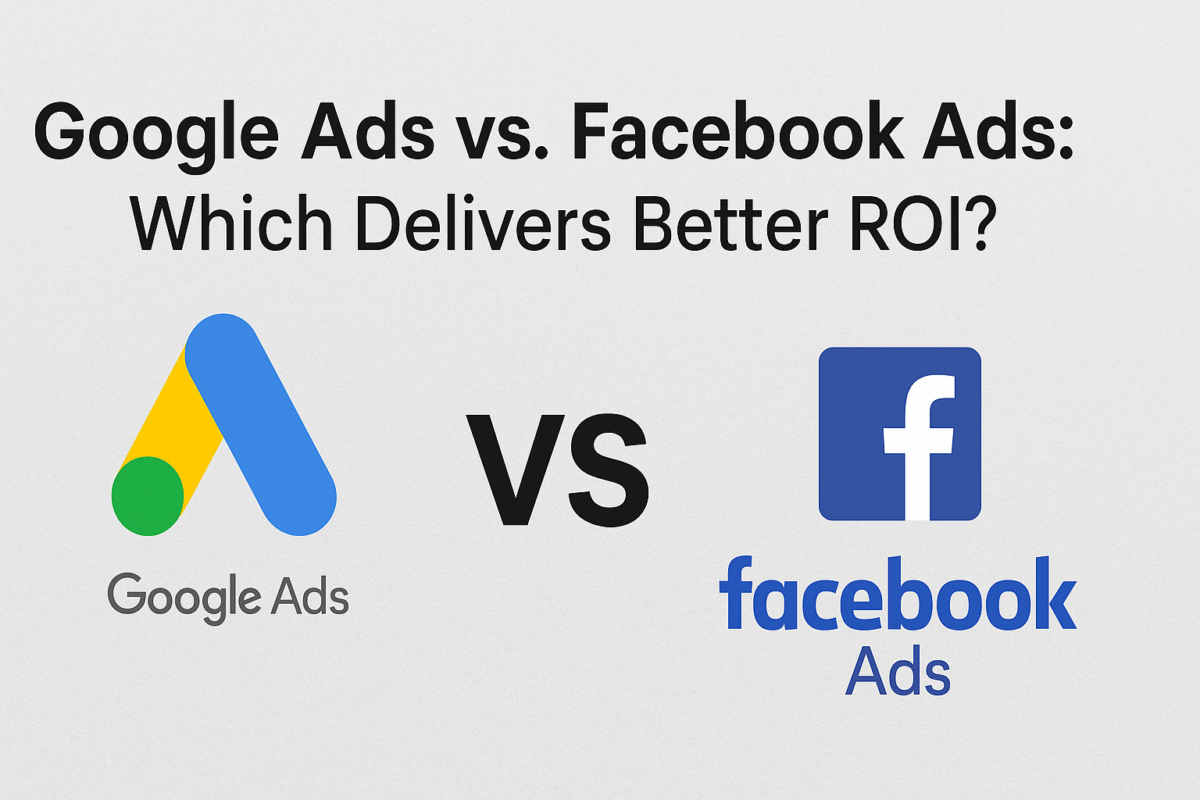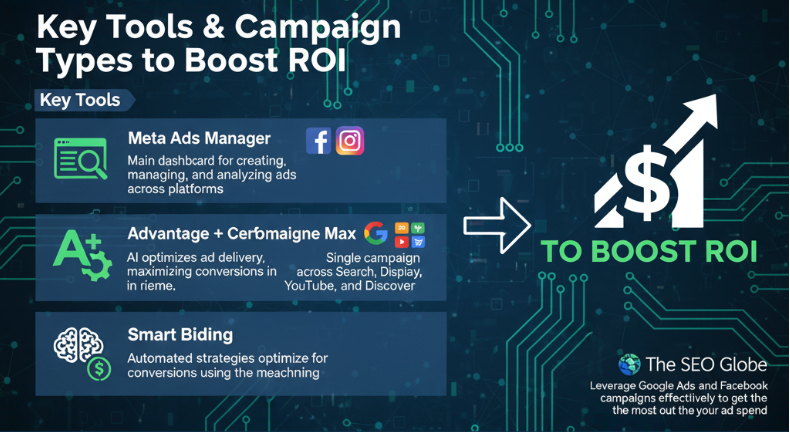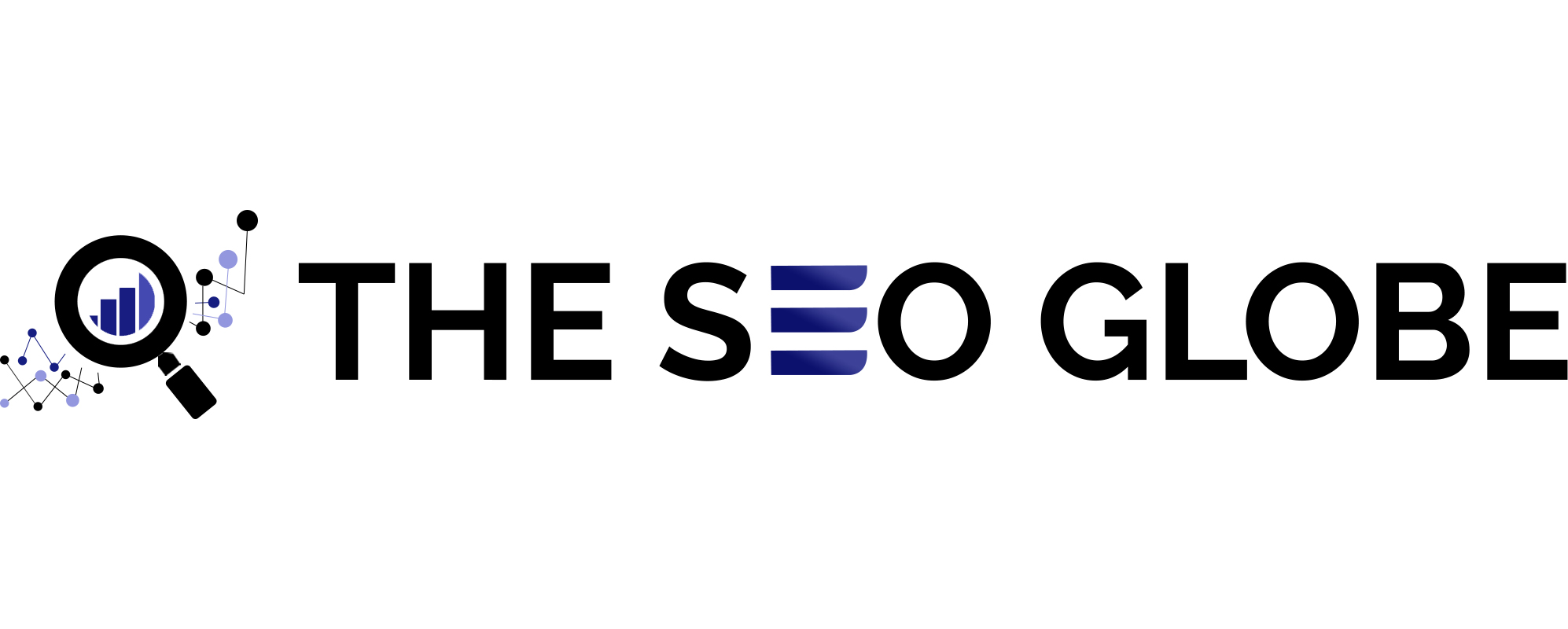Google Ads vs. Facebook Ads ROI in 2025

Google Ads deliver faster ROI by targeting people actively searching for your products or services (avg CPC $2–$4; Legal $50+). Facebook Ads provide longer-term ROI through brand awareness and engagement (avg CPC $0.50–$1.50; CPM ~$7). Using both together often gives the best results.
Quick Takeaways: Google Ads vs. Facebook Ads
- Different strengths:
Google Ads = capture high-intent searches → quick conversions.
Facebook Ads = spark discovery → build awareness & nurture audiences.
- Cost differences:
Google Ads often have a higher CPC, but the leads are warmer and more likely to convert.
Facebook Ads usually cost less per click, making them ideal for reach and engagement.
- ROI focus:
Google delivers faster ROI for time-sensitive services and local businesses.
Facebook delivers long-term ROI through engagement, retargeting, and community building.
- Pros & cons:
Google Ads = great targeting by intent but pricier in competitive niches.
Facebook Ads = powerful visuals and broad reach, but weaker on purchase intent.
- Funnel fit:
Facebook shines at the top of the funnel (awareness, engagement).
Google dominates at the bottom of the funnel (ready-to-buy conversions).
Both are valuable for remarketing.
- Choosing by business goals:
Quick sales → Google Ads.
Audience growth → Facebook Ads.
Balanced ROI → Use both together.
- Working together:
Facebook builds familiarity, Google captures conversions.
Cross-platform retargeting and consistent messaging boost results.
Sharing insights across campaigns makes both channels smarter.
Instead of asking “Which is better?”, align your ad platform with your business goals, or better yet, combine both to maximize ROI.
When it comes to digital marketing, one of the biggest questions businesses face is Google Ads vs. Facebook Ads, which one should you choose, and more importantly, which gives you a better return on investment (ROI)?
The truth is, both platforms are powerful, but they work in very different ways. At The SEO Globe, we help businesses understand these differences and make smart decisions about where to spend their ad budget. If you’ve ever found yourself stuck trying to figure this out, you’re not alone. Let’s break it down in a way that actually makes sense.
Understanding the Basics
Before we dive into ROI, let’s quickly recap how these platforms work:
- Google Ads is all about intent. People go to Google when they’re actively searching for something. If someone types in “best running shoes near me,” and your ad shows up, you’ve got a hot lead right there.
- Facebook Ads is more about discovery. People aren’t searching for your product; instead, your ad pops up while they’re scrolling through photos, memes, or updates. It’s like saying, “Hey, we thought you might like this!”
So the question becomes: Do you want to catch someone when they’re already looking for your product, or do you want to spark interest in people who didn’t know they needed it?
The Cost Factor: Rough Comparisons
Here’s where it gets interesting, costs. Here’s a simple way to look at it:
- Google Ads Cost: Generally, you’re paying a bit more per click because you’re bidding on specific keywords. The upside is that these clicks are often from people who are ready to buy or take action.
- Facebook Advertising Cost: Typically, the cost per click is lower. But keep in mind, you’re targeting based on interests and demographics rather than intent. That means you may need more clicks before seeing conversions.
Think of it this way: Google is like setting up shop in a busy marketplace where people are already shopping, while Facebook is like setting up a stall at a community fair, you get exposure, but you’ll need to do more convincing.
2025 Benchmarks for Google Ads & Facebook Ads
| Platform | Metric | Benchmark | Source |
| Google Ads | Avg CPC (across industries) | $2–$4 | WebFX |
| Competitive industries (Legal/Finance) | $50+CPC | WordStream | |
| Avg CTR (Search Ads) | 3–6% | WordStream | |
| Facebook Ads | Avg CPC | $0.50–$1.50 | Hootsuite |
| Avg CPM | $7–$10 | AdEspresso | |
| Avg CTR | ~0.9% | SocialInsider |
ROI: What Really Matters
When we talk about ROI, it’s not just about how much you spend, it’s about what you get back.
- Google Ads ROI: Businesses often see faster conversions because users are searching with intent. If your campaign is well-optimized, you can expect a healthy return, especially for industries where timing is everything (like home services or urgent needs).
- Facebook Ads ROI: ROI here comes from volume and engagement. Even if not every click turns into a sale, Facebook helps build brand awareness, grow your audience, and create long-term customers. It’s especially effective for lifestyle brands, e-commerce, and products that people might buy on impulse.
Google Ads vs. Facebook Ads Cost: Which Is Better for ROI?
| Feature / Factor | Google Ads | Facebook Ads |
| Cost Per Click (CPC) | Generally higher, especially in competitive industries (e.g., law, finance). | Usually lower CPC, making it cost-effective for reach and engagement. |
| User Intent | High intent – users are actively searching for what they need. | Low intent – users aren’t searching, but you can spark interest with targeting. |
| ROI Speed | Faster ROI – great for immediate conversions (leads, bookings, sales). | Slower ROI – better for long-term nurturing and brand building. |
| Best For | Conversions, high-intent leads, time-sensitive offers. | Awareness, audience growth, relationship building, retargeting. |
| Ad Formats | Mostly text-based (Search), plus Display & Shopping ads. | Highly visual – images, videos, carousel, stories, reels. |
| Targeting Style | Keyword-driven targeting (what people are searching for). | Demographic, interest, and behavior-based targeting. |
| Scalability | Easily scalable but costs rise quickly in competitive markets. | Scales well for broad awareness with relatively lower costs. |
| Synergy Together | Captures ready-to-convert leads. | Warms up audiences and builds trust before they convert on Google. |
This is the classic debate, and honestly, it’s where many marketers end up scratching their heads. On paper, comparing Google Ads vs. Facebook Ads cost seems like the easiest way to decide.
But here’s the catch: cost alone doesn’t tell the full story. These platforms are built for different goals, and that’s why your ROI (return on investment) can look very different depending on what you want to achieve.
Think of Google Ads as the “fast-track” option. Someone types in “best running shoes near me” or “emergency plumber in Chicago,” and boom they’re ready to buy.
You’re reaching people with high intent, and that often leads to quicker, measurable conversions. The cost per click might feel higher at times, but the quality of the lead often makes up for it.
Facebook Ads, on the other hand, play the long game. Instead of waiting for people to search for you, you’re putting your brand right in front of them while they scroll.
That makes Facebook perfect for building awareness, creating connections, and nurturing leads who might not convert instantly but could become loyal customers over time. Plus, the targeting options are so precise that you can really drill down into niche audiences.
Here’s the magic: sometimes the best ROI doesn’t come from choosing one over the other but from letting them work together. Imagine this, someone notices your ad on Facebook, likes your vibe, but doesn’t click right away.
A few days later, they’re actively searching on Google for what you offer, and your ad pops up again. Now, you’re familiar. You’re trusted. And the chance of them converting skyrockets. That’s when the combination truly pays off.
Pros and Cons of Google Ads
Pros:
- High-Intent Audience: Your ads appear when users are actively searching, making them more likely to convert.
- Immediate Visibility: Paid search places you at the top of Google results instantly.
- Measurable Performance: Detailed analytics allow you to track ROI, clicks, and conversions clearly.
- Scalable Campaigns: Easy to scale budgets up or down based on results.
Cons:
- Higher Costs in Competitive Niches: Industries like law or finance can see very high CPCs.
- Steep Learning Curve: Optimizing keywords, bids, and quality scores takes expertise.
- Limited Creative Options: Google Ads rely mostly on text, which can feel less engaging than visual ads.
Pros and Cons of Facebook Ads
Pros:
- Massive Reach: Access to billions of active users across Facebook and Instagram.
- Advanced Targeting: Pinpoint audiences by demographics, interests, and behaviors.
- Visual Storytelling: Use images, videos, and carousel ads to capture attention.
- Cost-Effective for Awareness: Often cheaper than Google Ads when it comes to impressions and reach.
Cons:
- Lower Purchase Intent: Users are browsing, not actively searching to buy.
- Ad Fatigue: Repetitive ads can quickly lead to lower engagement.
- Tracking Challenges: Privacy changes (like iOS updates) can affect ad performance data.
- Variable ROI: Strong for some industries (e.g., e-commerce), weaker for others (e.g., B2B services).
Facebook Ads vs Google Ads by Funnel Stage
Both platforms shine at different points in the marketing funnel:
- Awareness Stage:
Facebook Ads work best here. They help you introduce your brand to a wide audience using eye-catching visuals and storytelling.
- Consideration Stage:
Facebook Ads can retarget users who engaged earlier.
Google Ads start to play a role, as users actively research solutions.
- Conversion Stage:
Google Ads dominate here. Search ads capture people with strong intent to buy, book, or sign up.
- Retention/Remarketing Stage:
Both platforms can be powerful. Facebook excels at retargeting past visitors with dynamic product ads, while Google’s display and remarketing campaigns keep your brand visible.
Facebook vs. Google Ads: Choosing Based on Business Goals
| Business Goal | Best Choice | Why |
| Generate high-intent leads / quick sales | Google Ads | Captures people actively searching for your product or service. |
| Build brand awareness & reach new audiences | Facebook Ads | Great for introducing your brand to people who may not know you yet. |
| Nurture and engage potential customers | Facebook Ads | Visual ads and retargeting keep your brand top of mind. |
| Maximize overall ROI | Both Together | Google delivers immediate conversions, while Facebook drives long-term trust. |
| Balance short-term wins with long-term growth | Both Together | Acts like “two nets”, one for quick results, the other for lasting impact. |
Instead of obsessing over which platform is “cheaper,” shift the question to what you actually want your ads to achieve. Cost is just one piece of the puzzle — your goals should drive the choice.
- Do you want high-intent leads who are already looking for your product or service? Google Ads is your best friend. It’s like showing up at the exact moment your customer is searching for you.
- Do you want to grow awareness and reach people who don’t know you yet? Facebook Ads are unbeatable here. They let you build brand recognition and start conversations with audiences who may not even realize they need you until they see your ad.
- Do you want to maximize ROI across the board? The smart move is often a mix of both. Google brings in immediate results, while Facebook keeps your pipeline warm by engaging new audiences and reminding them of your brand.
For many businesses, combining Google and Facebook Ads creates a sweet balance: instant visibility with Google, and long-term trust-building with Facebook.
Think of it like fishing with two nets instead of one, you’re more likely to catch both the quick wins and the bigger, long-term opportunities.
How Can You Use Google Ads and Facebook Ads Together?
|
Strategy |
How It Works |
Why It Matters |
| Awareness + Conversion Flow | Use Facebook to spark curiosity with eye-catching visuals, then capture intent on Google when users search for your brand or product. | Creates a smooth path from “I’ve seen you before” to “I’m ready to buy.” |
| Smart Retargeting | Run Facebook campaigns to re-engage visitors with dynamic ads or video reminders, while Google closes the deal through search and display. | Keeps your brand in front of people until they’re ready to take action. |
| Unified Messaging | Align visuals, offers, and tone across both platforms so users instantly recognize your brand wherever they interact. | Consistent storytelling builds trust and improves conversion rates. |
| Cross-Platform Insights | Share learnings between platforms, strong creatives or audience segments from one channel can guide better targeting on the other. | Turns two separate ad accounts into a smarter, connected system. |
Key Tools & Campaign Types to Boost ROI
 To get the most out of Google Ads and Facebook Ads, it’s not just about choosing a platform, it’s also about using the right tools and campaign types. Here’s a quick overview:
To get the most out of Google Ads and Facebook Ads, it’s not just about choosing a platform, it’s also about using the right tools and campaign types. Here’s a quick overview:
Meta Ads Manager
This is Facebook and Instagram’s main dashboard for creating, managing, and analyzing ads. It lets you set budgets, target specific audiences, and track performance, making it easier to optimize campaigns for ROI.
Advantage and Campaigns
Formerly called “Automated Ads,” Advantage and campaigns use AI to automatically optimize ad delivery across Meta platforms. They help maximize conversions by adjusting targeting, placement, and bidding in real time.
Google Performance Max
Performance Max campaigns are Google’s AI-driven solution for multi-channel advertising. They let you run a single campaign across Search, Display, YouTube, and Discover, helping capture high-intent leads while simplifying management.
Smart Bidding
Both Google and Meta offer automated bidding strategies to get the most value from your budget. Smart Bidding uses machine learning to optimize for conversions or conversion value, ensuring every dollar spent works harder.
Using these tools and campaign types strategically allows businesses to improve targeting, reach the right audiences, and ultimately boost ROI. At The SEO Globe, we help you leverage Google Ads and Facebook campaigns effectively to get the most out of your ad spend.
Final Thoughts
At the end of the day, the whole Facebook Ads vs. Google Ads debate really comes down to your business goals. There’s no one-size-fits-all answer.
Some businesses thrive with Google’s search-driven ads, while others get more traction from Facebook’s audience-focused approach.
The real trick is to test, measure, and refine. Start small, see what works, and then scale up where you’re getting the best ROI.
If you’re looking to make sense of your ad spend and get the most out of it, we’re here to help. At The SEO Globe, our team knows the ins and outs of both platforms, and we’ll help you create a strategy that doesn’t just spend money, it brings it back.
For a deeper comparison, check out our detailed guide on Facebook Ads vs. Google Ads.
Frequently Asked Questions:
- Which is cheaper, Google Ads or Facebook Ads?
It really depends on your goals. Facebook Ads often feel cheaper upfront, but Google Ads can bring in higher-intent leads who are ready to buy. - Can small businesses afford to run ads on both platforms?
Yes, many small businesses do. You don’t have to spend a huge amount, just start small on both platforms and test which brings better results for your audience. - Do Google Ads work better for local businesses?
Absolutely. If people are actively searching for services “near me,” Google Ads can capture those high-intent local customers quickly. - Are Facebook Ads good for B2B businesses?
Yes, especially for building awareness and reaching decision-makers. Targeting options on Facebook and Instagram can help connect with very specific professional groups. - How long does it take to see results from Google Ads vs Facebook Ads?
Google Ads can show results almost instantly since it targets active searches. Facebook Ads may take a little longer as they focus on building awareness and engagement. - Can I run Facebook Ads without having a big social media following?
Yes, you can. Facebook Ads don’t rely on your current followers, they help you reach entirely new audiences. - What type of budget should I start with for online ads?
There’s no fixed number. Think in terms of what you’re comfortable testing with. Even a modest daily budget can give you useful data to refine your campaigns. - Which ads are better for driving quick sales?
Google Ads usually win here because they target people already searching for products or services. - Are Facebook Ads only good for brand awareness?
Not at all. While they’re amazing for awareness, they can also generate leads and sales when campaigns are set up correctly with strong targeting. - Should I choose one platform or use both?
If possible, try using both. A customer might first see your ad on Facebook and later click your Google Ad when they’re ready to buy. That’s when the mix really pays off.

